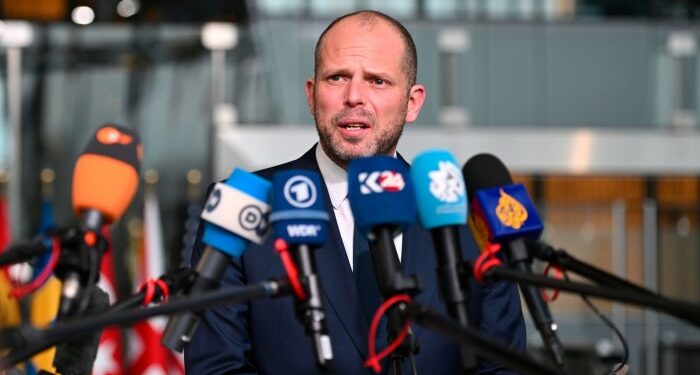Some content could not load. Check your internet connection or browser settings.
German Chancellor Olaf Scholz has said German trains are still better than those in England, where “nothing works any more”. An FT data analysis suggest he’s wrong.
Adaptation
The harsh realities of the war in Ukraine and impending US isolationism have convinced Denmark, one of Europe’s biggest misers, to consider higher EU spending, writes Paola Tamma.
“We need to focus our budget on what makes us stronger, what makes us wealthier,” Danish EU affairs minister Marie Bjerre told the FT.
Context: The European Commission will present a proposal for the bloc’s next long-term budget in July, kicking off years-long negotiations that will start under Copenhagen’s chairmanship of the EU Council in the latter half of this year.
Denmark is traditionally a member of the “frugal” group of northern countries that have resisted calls for increased EU spending or joint borrowing. But Copenhagen has recently changed its tune on common debt, and Bjerre said she was open to discussing a bigger EU budget.
“We are open-minded, and that’s actually the change,” said Bjerre. She said this was due to “a situation where we have to be able to defend ourselves and to react to the crisis Europe is facing”.
Copenhagen’s stance is significant, as it will lead the budget negotiations. Bjerre said she hoped that external pressure would help reach consensus among the 27 member states.
“There is a sense of urgency right now because of the war for Ukraine and also because we are now sliding back [economically] compared to the US,” she said.
Reforming the budget could also mean that traditional spending areas such as agricultural subsidies and funding for regions could come with greater strings attached, conditional on “bold reforms”, Bjerre said, adding that “new critical sectors that will enhance our competitiveness” might need to be prioritised.
As time is pressing, the commission is expected to already propose defence funding options in mid-March. “We have no luxury to wait until 2028 when it comes to funding defence,” EU budget commissioner Piotr Serafin said yesterday in Warsaw, referencing the start of the new budget period.
What to watch today
French President Emmanuel Macron hosts a virtual meeting of leaders on Ukraine and defence.
Italian Prime Minister Giorgia Meloni hosts Israeli President Isaac Herzog in Rome.
Now read theseRecommended newsletters for you
Free Lunch — Your guide to the global economic policy debate. Sign up here
The State of Britain — Peter Foster’s guide to the UK’s economy, trade and investment in a changing world. Sign up here
Are you enjoying Europe Express? Sign up here to have it delivered straight to your inbox every workday at 7am CET and on Saturdays at noon CET. Do tell us what you think, we love to hear from you: [email protected]. Keep up with the latest European stories @FT Europe
Source link : http://www.bing.com/news/apiclick.aspx?ref=FexRss&aid=&tid=67b57df3122b4b27bbcbc7f48cb93a07&url=https%3A%2F%2Fwww.ft.com%2Fcontent%2Ff4bde773-0c34-49d9-bc94-48b19bd36b53&c=6862602457758754871&mkt=de-de
Author :
Publish date : 2025-02-18 22:00:00
Copyright for syndicated content belongs to the linked Source.


